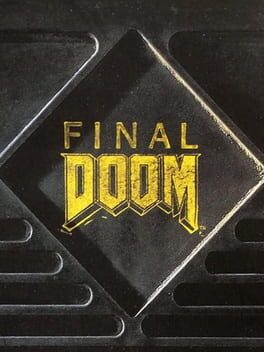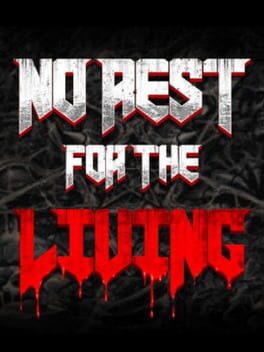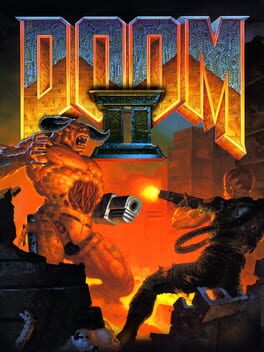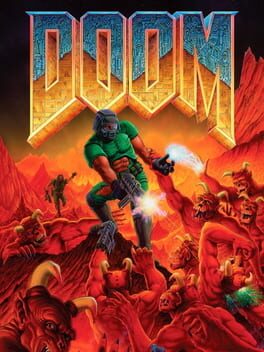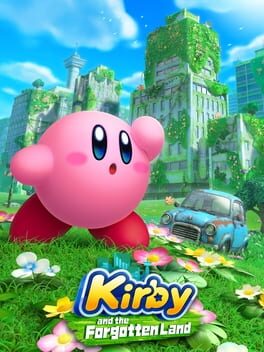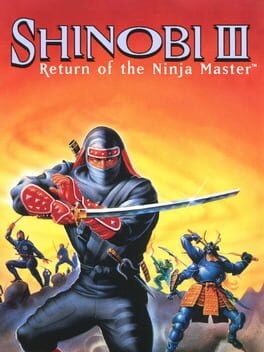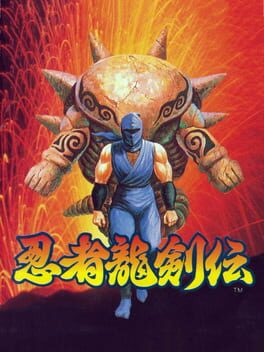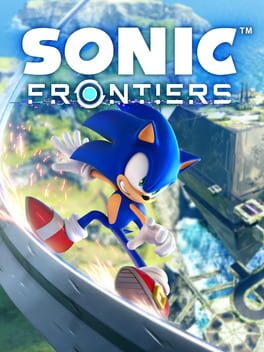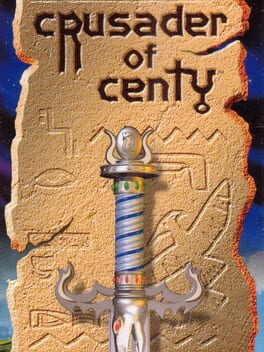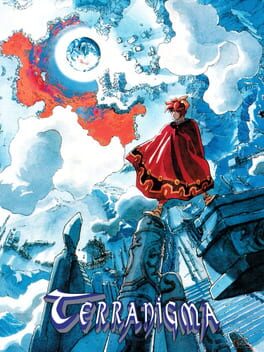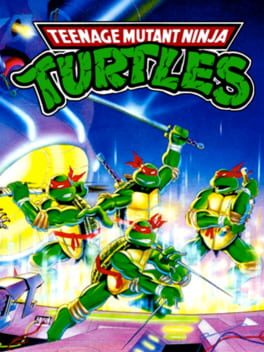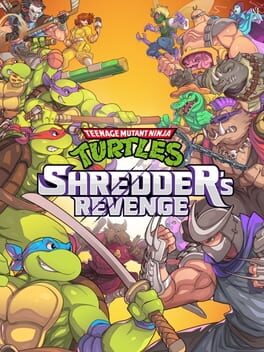2019
I went all-in on the Doom remasters in the winter of 2021, and had an enormously good time with most of them — I found the original games held up spectacularly well, and some of the WADs were legitimately great.
I can't say that about the two episodes original released as Final Doom. There are some clever maps in TNT, but there are a lot of big empty confusing ones too. It burned me out, and I never finished Plutonia as a result, even though common wisdom suggests it's the better of the two. Skipped ahead to No Rest for the Living, and had a much better time there.
I can't say that about the two episodes original released as Final Doom. There are some clever maps in TNT, but there are a lot of big empty confusing ones too. It burned me out, and I never finished Plutonia as a result, even though common wisdom suggests it's the better of the two. Skipped ahead to No Rest for the Living, and had a much better time there.
You’d expect a Nerve-software developed Doom episode to be great, having been developed a good 15+ years after the original releases, and you would be correct. At just 9 maps (Doom I episode length) it doesn’t overstay its welcome, and the levels are fun enough that I actually wanted to find the secrets in everything. Played on Switch as part of the recent remasters.
2019
In my memory Doom II is just "more Doom" but there's quite a bit of difference between the two despite running on the same engine. Doom II's inclusion of the Super Shotgun and the new enemies both do a lot to change encounters, and the map design style is much more open and puzzle-y than the first game.
The maps for Doom II feels a bit more abstract and don't sell the setting as well as the first three episodes which tell a pretty tight and convincing story between the three (Military Base -> Hell overtaking said base -> Hell itself). It's supposed to be Earth, but it isn't especially cohesive, and the more sprawling levels aren't as fun. The final boss is also some real bullshit.
Doom II is interesting and challenging, and has a few standout maps, but is a less consistently great package than the first game, which for me is a perfect game. Still, it's built on great bones, and I'd rather have an interesting if somewhat flawed followup than just more of the same.
The maps for Doom II feels a bit more abstract and don't sell the setting as well as the first three episodes which tell a pretty tight and convincing story between the three (Military Base -> Hell overtaking said base -> Hell itself). It's supposed to be Earth, but it isn't especially cohesive, and the more sprawling levels aren't as fun. The final boss is also some real bullshit.
Doom II is interesting and challenging, and has a few standout maps, but is a less consistently great package than the first game, which for me is a perfect game. Still, it's built on great bones, and I'd rather have an interesting if somewhat flawed followup than just more of the same.
2019
It has been actual decades since I did anything more than poke around a couple levels in the original Doom, and this release inspired me to sit down and play it through from beginning to end. And the end, my take is this: goddamn are these games incredible. This isn't news to me or anyone else, but sitting down and making my way through the campaign, hunting down secrets, and just giving it my focus in the way I would a new game has helped me appreciate it anew. It helps that aside from a few particular secrets, most of the levels have evaporated from my memory and feel totally fresh.
The original Doom (Episodes 1–3) is a legit masterpiece, and not only has it held up insanely well, I'd go so far as to say it could stand toe-to-toe with any other FPS, including ones released this decade, and would still eclipse many of them.
The original Doom (Episodes 1–3) is a legit masterpiece, and not only has it held up insanely well, I'd go so far as to say it could stand toe-to-toe with any other FPS, including ones released this decade, and would still eclipse many of them.
I was a big fan of the PS4 Spider-Man game, despite its AAA crud. Swinging and combat were both fun, and the story was a solid Spider-Man tale.
Unfortunately, almost everything has gotten a little worse with the second go-around:
• The new gadget and skills system is a big downgrade from the first one, particularly in how in limits your options during stealth encounters.
• Collectibles and side-missions just aren't very interesting or rewarding. The Spider-Bots are no replacement for the backpacks which gave a look at Spider-Man's past — you get a most a cute one-liner, and your reward is a small cutscene with a character who was cut from the Spider-Verse movie. Okay.
• The randomized crimes are far less varied than the first game. They've cut a bunch of crime types, and there's less mixing of what's there. And they aren't required for completion, so there's no reason to engage with them. Maybe they knew they made them boring?
• Why introduce Kraven and then just make him a boss of a yet another occupying force? His whole thing is hunting, yet he does not do any hunting in this game. I was hoping for a Mr. X-like ever-present force that changed up the core gameplay loop, but no.
Top it all off with a story that is pretty messy and doesn't do justice to either story they're kind of adapting (Kraven's Last Hunt + the symbiote/Venom arc) and you're left with real disappointing followup.
Unfortunately, almost everything has gotten a little worse with the second go-around:
• The new gadget and skills system is a big downgrade from the first one, particularly in how in limits your options during stealth encounters.
• Collectibles and side-missions just aren't very interesting or rewarding. The Spider-Bots are no replacement for the backpacks which gave a look at Spider-Man's past — you get a most a cute one-liner, and your reward is a small cutscene with a character who was cut from the Spider-Verse movie. Okay.
• The randomized crimes are far less varied than the first game. They've cut a bunch of crime types, and there's less mixing of what's there. And they aren't required for completion, so there's no reason to engage with them. Maybe they knew they made them boring?
• Why introduce Kraven and then just make him a boss of a yet another occupying force? His whole thing is hunting, yet he does not do any hunting in this game. I was hoping for a Mr. X-like ever-present force that changed up the core gameplay loop, but no.
Top it all off with a story that is pretty messy and doesn't do justice to either story they're kind of adapting (Kraven's Last Hunt + the symbiote/Venom arc) and you're left with real disappointing followup.
It's fine. I mostly enjoyed it while playing it, but it hasn't really stuck with me. Probably the better of the 3D era of Kirby games, but the decision to cap your flying height depending on your starting elevation makes some of the platforming feel less than great. Like most modern Kirby games, it was a fine distraction that I probably won't think about much ever again.
An absolute stunner. When you get into a groove, the game melts like warmed butter against your sword. Getting into that groove can sometimes be difficult, and requires you to get very familiar with the rhythm of stringing your various movement and combat options together, but when you nail it, it feels like nothing else. One of the best action games on the Genesis and an absolute must-play.
1992
One of the NES greats, and it plays just as great on PC Engine. I dig the graphics, and it's a much better looking game than the the SNES Trilogy version. The new music tracks are sometimes good, sometimes less good. I feel like maybe the game is slightly easier than the NES original, but whether that's due to many years of experience or any actual programming differences, I can't say.
2022
The idea of an "open zone" structure feels like a great idea for Sonic: a wide open space to go fast, interspersed with brief platforming challenges sounds great fun. Unfortunately, Sonic Frontiers forgot to put a real Sonic spin(dash) on it. The typical open-world map progression challenges are super easy and not at all rewarding, and between item collecting, leveling up, and a skill tree, there’s just a little too much that doesn’t feel like it belongs in a Sonic game.
My biggest gripe is that the game just looks boring. The first two maps are basically “grass” and “desert” and none of the environment, enemy, or item design feels like it has anything to do with Sonic. I don't need Green Hill Zone, but some checkerboards, loops, and cartoony machines shouldn't be too much to ask for. Instead, we have mostly empty spaces connected by grind rails punctuated by some distinctly non-Sonic enemies.
And then there's the cyberspace levels, which have all of that, but there are only 4 kinds of stages repeated again and again. I would've liked to see those assets used for the main islands, and just integrate those longer speed-focused stages into the main areas, rather than have them weirdly segmented.
As-is, I've shelved the game for now — as fun as it is to zip around, after three incredibly similar and barren islands and a dozen+ cyberspace levels that all look the same, I'm not intrigued by what might be coming next. I expect it's a lot of the same.
My biggest gripe is that the game just looks boring. The first two maps are basically “grass” and “desert” and none of the environment, enemy, or item design feels like it has anything to do with Sonic. I don't need Green Hill Zone, but some checkerboards, loops, and cartoony machines shouldn't be too much to ask for. Instead, we have mostly empty spaces connected by grind rails punctuated by some distinctly non-Sonic enemies.
And then there's the cyberspace levels, which have all of that, but there are only 4 kinds of stages repeated again and again. I would've liked to see those assets used for the main islands, and just integrate those longer speed-focused stages into the main areas, rather than have them weirdly segmented.
As-is, I've shelved the game for now — as fun as it is to zip around, after three incredibly similar and barren islands and a dozen+ cyberspace levels that all look the same, I'm not intrigued by what might be coming next. I expect it's a lot of the same.
1994
A fine game that doesn’t quite live up to the promise of “The Sega Genesis’ answer to The Legend of Zelda”. The animal partners are a unique take on the items, and combining the attack and movement partners to find a play style that works for you is pretty fun. Unfortunately, the game never really forces you to master most of them. The combat is a little loose, and the bosses don’t put up much of a challenge. I appreciated the somewhat melancholy story, but the script isn’t great and the story isn’t told particularly well. I’m glad I played it, but it didn’t quite live up to the hype for me.
1995
It's really too bad Terranigma wasn't released in the US, as I'm confident that if more people played it, it'd be counted amongst the greatest the SNES has to offer. As it came late in the SNES’ lifecycle, you’d expect it to be an absolute stunner in the graphics department, and it is. It goes back to Soul Blazer’s (much better) approach to leveling, but learns the lessons of Illusion of Gaia — while it has more complex combat options, they feel natural to use and they’re much more useful. It’s also got a beautiful, compelling (and comprehensible) story, filled with interesting characters and sidequests that feel rewarding and fun. I only wish that I'd played it sooner.
2022
With its particular brand of pattern-based challenge and dependence on the manual, Tunic captures the feeling of playing an 8-bit NES game better than most retro-style pixel art games.
I loved the way it slowly reveals its mechanics and secrets to you, and found the combat very rewarding once you start to understand the various tools at your disposal. I loved the meta aspects to the game, both in its story and in the way certain visuals were designed. Its subtle, and feels honest rather than too clever for its own good (with maybe one or two exceptions).
I found the over-reliance on the Holy Cross puzzles to be a bit off-putting, though. I appreciated them a bit, but it seemed like the game didn't have any other ideas for pulling secrets out of the manual's pages. By the end, it got a bit repetitive, and a lot of the clever stuff was optional. I'd love to see a sequel that not only required the manual for more important moments, but found additional ways to make that work beyond "here are some lines."
All in all, I really enjoyed my time with it, despite its flaws, and I'm really looking forward to seeing what comes next from the people involved.
I loved the way it slowly reveals its mechanics and secrets to you, and found the combat very rewarding once you start to understand the various tools at your disposal. I loved the meta aspects to the game, both in its story and in the way certain visuals were designed. Its subtle, and feels honest rather than too clever for its own good (with maybe one or two exceptions).
I found the over-reliance on the Holy Cross puzzles to be a bit off-putting, though. I appreciated them a bit, but it seemed like the game didn't have any other ideas for pulling secrets out of the manual's pages. By the end, it got a bit repetitive, and a lot of the clever stuff was optional. I'd love to see a sequel that not only required the manual for more important moments, but found additional ways to make that work beyond "here are some lines."
All in all, I really enjoyed my time with it, despite its flaws, and I'm really looking forward to seeing what comes next from the people involved.
The game you think you remember playing as a kid. It's just fun, and it plays every hit you'd want from it. I wish it were a little more ambitious and a liiiiittle less anchored to nostalgia for the original games, but I'm a sucker so I still love it. Can't imagine it converts anyone who isn't already into this sort of thing, but I am, so give me the slop.
Minus one star for the cartoon Slash design over the vastly superior toy/Turtles in Time one and because it doesn't have the perfect, deep wallop sound from that game. I realize I said I wished it was less nostalgic and then dinged it for arguably not being enough like an older thing, and I promise to do my penance for that.
Minus one star for the cartoon Slash design over the vastly superior toy/Turtles in Time one and because it doesn't have the perfect, deep wallop sound from that game. I realize I said I wished it was less nostalgic and then dinged it for arguably not being enough like an older thing, and I promise to do my penance for that.
2020
